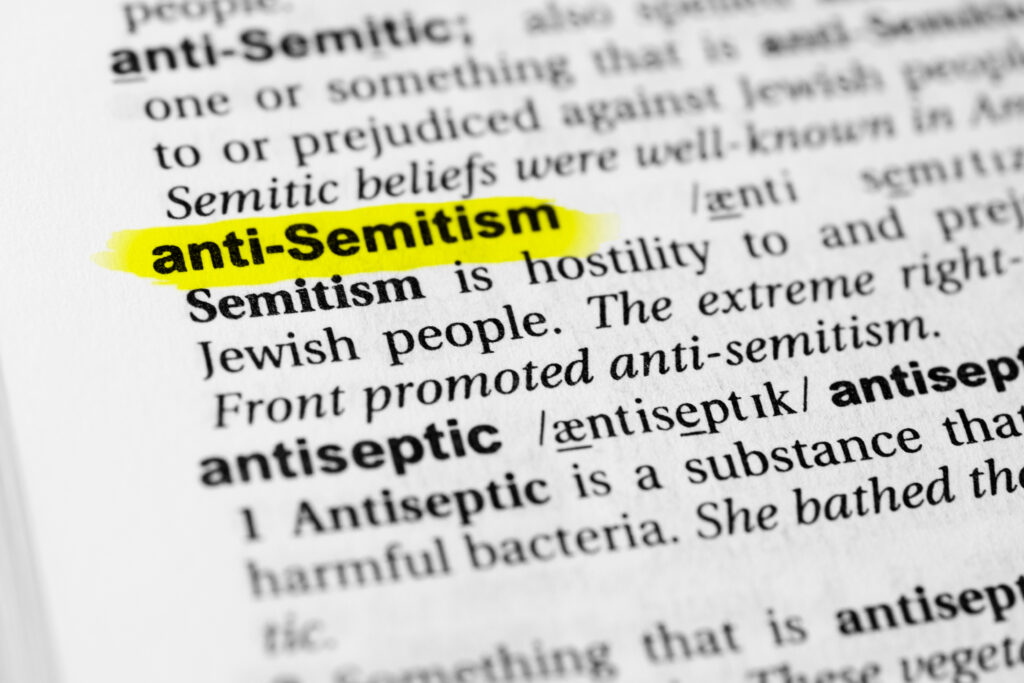Opinion: A Second Crisis for Jews in Massachusetts: Defining Antisemitism

Photo: Shutterstock
For more than two years Jewish communities across Massachusetts and the nation have struggled with their relationship to the state of Israel, particularly its horrific actions in Gaza and the West Bank, in response to the hostage-taking and murders of Israeli citizens by Hamas on October 7, 2023. Many scholars believe Israel’s policies toward Palestinians constitute a genocide, and this issue – loyalty to the Jewish state versus massive civilian casualties in Gaza – has deeply divided Jewish communities. A recent Washington Post poll indicated that 40 percent of American Jews now think Israel is committing genocide. (Many American Jews sharply critical of Israel on Gaza …) This is a powerful indication of how divided our community is on this issue.
The aftermath of the Holocaust in our country created a profound and visceral fear for many American Jews, despite achieving greater economic security. Here, it was fringe-groups on the right, along with the KKK, that were and remain virulently antisemitic. An increasing number of these forces are being mainstreamed in our country, amidst the rise of white nationalism. And yet as far as antisemitism is concerned, those in power are focused elsewhere.
In Massachusetts, we now face another divisive threat: Co-chaired by John Velis of Westfield, the Massachusetts Special Commission on Combating Antisemitism is promoting policies related to the International Holocaust Remembrance Association’s (IHRA) definition of antisemitism. The IHRA provides a multi-faceted set of “definitions” which, from its very origins in 2016, has been controversial. The core of this controversy centers on how the IHRA equates criticism of Israel with antisemitism. Organizations like the Anti-Defamation League (ADL) have vigorously promoted the idea that criticism of Israel or Zionism is antisemitic. In 2021 a group of scholars produced the Jerusalem Declaration on Antisemitism in response to the IHRA. That declaration more clearly distinguishes differences between antisemitism and critiques of the Israeli state.
Over the past several years, the IHRA definition of antisemitism has been promoted internationally and nationally in a way that effectively suppresses speech that is critical of Israel and/or Zionism or, more troubling, is in any way supportive of Palestinian national aspirations.
Trump administration figures have been in the forefront of this IHRA -related campaign. One disturbing example is the broad-based attack on universities – threatening to cut research funding unless institutions comply with demands to, among other things, limit the content of speech, especially pro-Palestinian speech, in the name of Jewish safety. This strategy has weaponized antisemitism, essentially suppressing free speech.
The Massachusetts Commission unfortunately stands as another example of this phenomenon. There are organizations like the Jewish Federation of Western Massachusetts that support the commission’s work. There are others like Together for an Inclusive Massachusetts (TIM) and Jewish Voice for Peace (JVP), as well as ad-hoc groups of Jews and non-Jews living throughout the Commonwealth, who have tried to impress upon this Commission that using the IHRA definition of antisemitism to make policies is wrong because it effectively chills free speech. One recommendation of the Commission links the expression of views critical of Israel or Zionism in K-12 schools (by students, staff or faculty) with possible reporting to the Massachusetts State Police Hate Crimes Unit.
Fighting antisemitism effectively requires complexity and should not place limitations on speech which is critical of Israel. The struggle against antisemitism, which is a fundamental need in our country, cannot be exclusive or give special treatment to Jews, but rather be embedded in the struggle against all forms of dehumanization, even when those hatreds have different or unique manifestations. Safety for all marginalized people who experience such hatreds should be our goal, not prioritizing one set over others.
Despite the Commission’s statements that they do not want to suppress free expression, this has been overwhelmingly how the IHRA has been utilized. There are many of us who are fearful that these attempts to “combat” antisemitism will achieve the opposite: They will increase Jew-hatred, not decrease it, because Massachusetts residents will be silenced from speaking their opinions about Israel, and they will blame Jews.
Finally, Kenneth Stern, one of the original drafters of the IHRA definition, has forcefully spoken against using the IHRA in the very manner that the Massachusetts Commission proposes – as the basis for governmental policies that will affect freedom of speech. What does it say when the very individual who helped write the IHRA says, in effect: Don’t do this.
With the Massachusetts Jewish community so divided on this issue, and the Commission knowing well of this division from much testimony, why are they promoting controversial policies regarding antisemitism when there is no agreement within the very community which is most affected?
Jeff Gold is a resident of Pelham.
